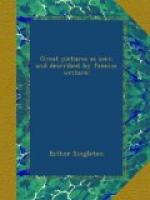All that shadowing, storming, and coiling of his, when you look into it, is mere stage decoration, and that of a vulgar kind. Light is, in reality, more awful than darkness—modesty more majestic than strength; and there is truer sublimity in the sweet joy of a child, or the sweet virtue of a maiden, than in the strength of Antaeus, or thunder-clouds of AEtna.
Now, though in nearly all his greater pictures, Tintoret is entirely carried away by his sympathy with Michael Angelo, and conquers him in his own field;—outflies him in motion, outnumbers him in multitude, outwits him in fancy, and outflames him in rage,—he can be just as gentle as he is strong: and that Paradise, though it is the largest picture in the world, without any question, is also the thoughtfullest, and most precious.
The Thoughtfullest!—it would be saying but little, as far as Michael Angelo is concerned.
For consider it of yourselves. You have heard, from your youth up (and all educated persons have heard for three centuries), of this Last Judgment of his, as the most sublime picture in existence.
The subject of it is one which should certainly be interesting to you in one of two ways.
If you never expect to be judged for any of your own doings, and the tradition of the coming of Christ is to you as an idle tale—still, think what a wonderful tale it would be, were it well told. You are at liberty, disbelieving it, to range the fields—Elysian and Tartarean, of all imagination. You may play with it, since it is false; and what a play would it not be, well written? Do you think the tragedy, or the miracle play, or the infinitely Divina Commedia of the Judgment of the astonished living who were dead;—the undeceiving of the sight of every human soul, understanding in an instant all the shallow and depth of past life and future,—face to face with both,—and with God:—this apocalypse to all intellect, and completion to all passion, this minute and individual drama of the perfected history of separate spirits, and of their finally accomplished affections!—think you, I say, all this was well told by mere heaps of dark bodies curled and convulsed in space, and fall as of a crowd from a scaffolding, in writhed concretions of muscular pain?
But take it the other way. Suppose you believe, be it never so dimly or feebly, in some kind of Judgment that is to be;—that you admit even the faint contingency of retribution, and can imagine, with vivacity enough to fear, that in this life, at all events, if not in another—there may be for you a Visitation of God, and a questioning—What hast thou done? The picture, if it is a good one, should have a deeper interest, surely on this postulate? Thrilling enough, as a mere imagination of what is never to be—now, as a conjecture of what is to be, held the best that in eighteen centuries of Christianity has for men’s eyes been made;—Think of it so!




